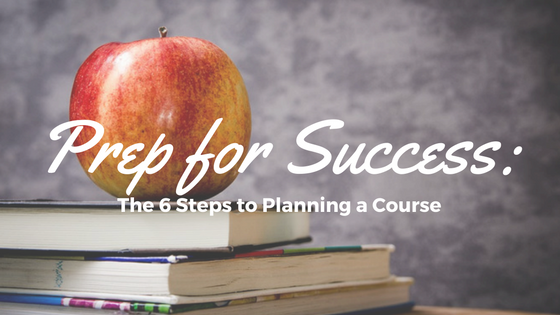
The most important part of a professor’s job isn’t done during the school year – it happens in the months and weeks before a course even begins! For many professors, developing a solid course plan is the key to a successful semester. This article will walk readers through the steps necessary to develop a course plan.
A course plan consists of six items: (1) a class description, (2) general goals for the course, (3) assessable goals for each general goal, (4) learning activities for each class, (5) formative assessments measuring each assessable goal, and (6) a summative assessment measuring the general goals of the course.
First, the class description should be thought of as a general mission statement for the course, identifying the purpose of the class to students and describing what parts of a discipline the students will cover. Second, the class description should include three to four general goals for the course, which specifically state the desired outcomes from the course. These general goals should broadly state the types of knowledge or skills your students should be able to perform by the end of the class.
Third, each general goal for your course should be assigned one to two assessable goals. These goals are more specific and measurable, and each goal should be small enough so that one or two lessons can achieve it. Assessable goals should use concrete language like “identify,” “compare,” and “contrast” to ensure that student achievement can be accurately measured.
Fourth, each assessable goal should contain one or two lesson plans with learning activities geared towards increasing students’ mastery of the goal. A lesson plan should contain the topic to be covered, prepared lectures or slides on the content, the readings or assignments that will be required for the lesson, and the interactive activities that will be conducted to help students attain the knowledge.
Fifth, each assessable goal should naturally be assessed; this means that each assessable goal should have an assessment attached to it to test whether or not students have learned the material. These interim assessments are called “formative” assessments because they measure student mastery to provide feedback to improve students’ performance on later assessments.
Finally, many classes will conclude with a larger summative assessment, which means an assessment that measures the totality of a student’s learning for the entire course. This assessment, which often takes the form of a final exam or a longer paper, should measure all of your assessable goals, allowing you to ascertain if your students have met the general goals of the class.
To summarize, your course plan should flow from your class description, which should provide a few general goals or learning objectives for the course. From each of these general goals flow more specific “assessable goals,” which are measured by formative assessments. Finally, many courses will end in a larger summative assessment that tests mastery of the general learning objectives. Following these six steps to develop a course can ensure your students are getting the most out of your class.

